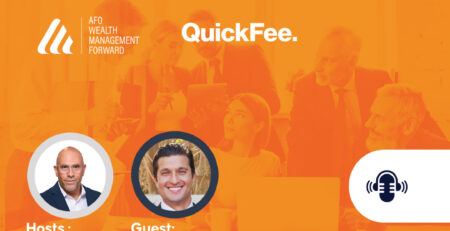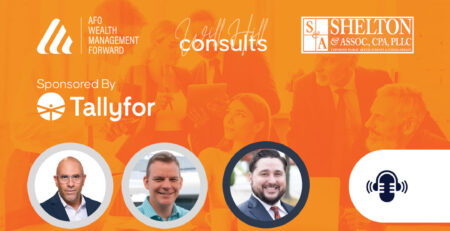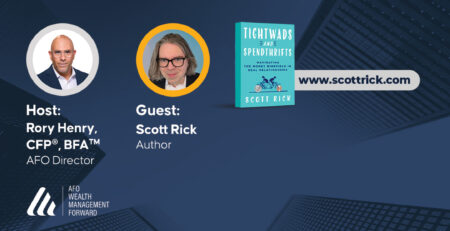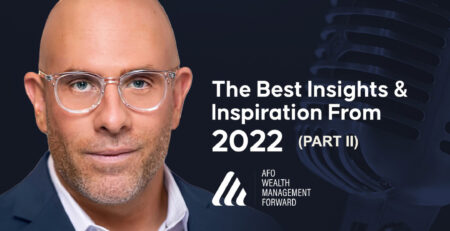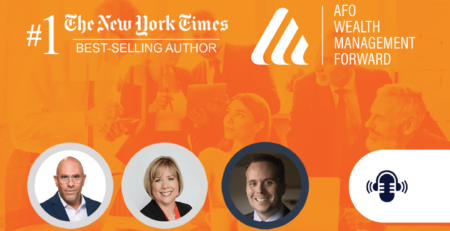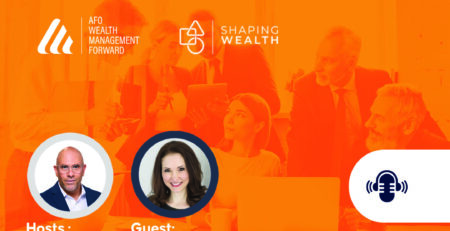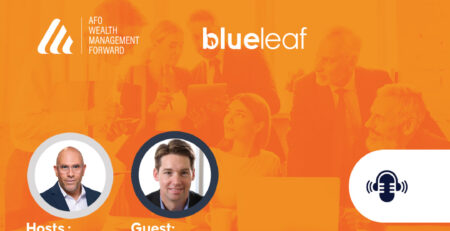Measure x Hack Your Life – Michael Hsu
AFO|Wealth Management Forward2023-07-06T08:55:29+00:00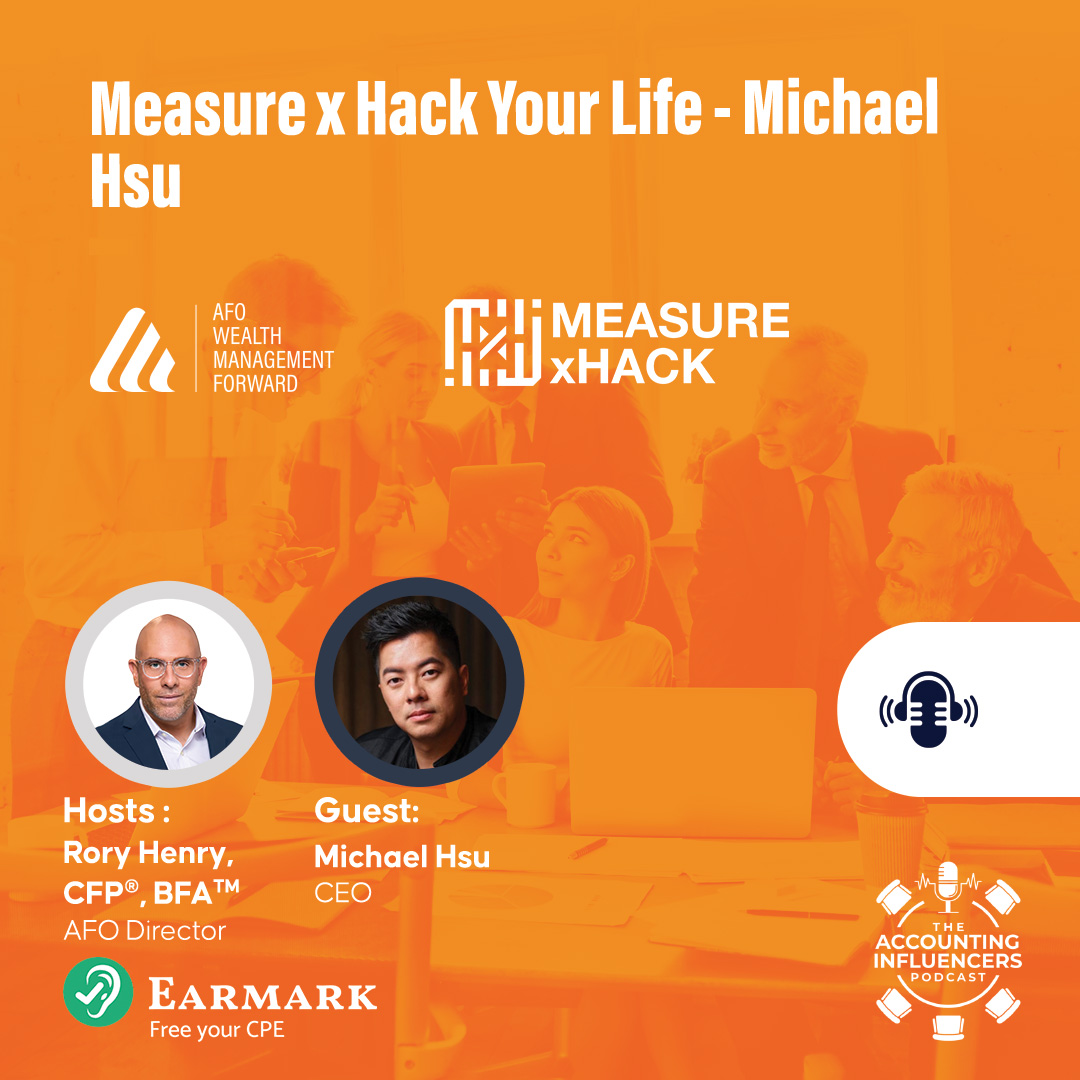
Connect on LinkedIn:
Connect with Michael Hsu
Connect with Rory Henry
Learn more about
Measure x Hack
Learn more about
Arrowroot Family Office
Measure x Hack Your Life w/ Michael Hsu
In this episode, Rory converses with Michael Hsu, founder, and CEO of DeepSky and the Measure x Hack Program, about the challenges and opportunities in accounting and ways in which to optimize our well-being through continual self-improvement. Michael talks about the accounting profession’s need to keep up with modern trends and technology so that they can provide optimal value to clients. They also discuss the problem of online self-proclaimed financial gurus on Tik-Tok and Instagram who lack real-life experience and credentials but still attract clients through effective marketing. Michael underscores the importance of continuous learning and introduces his how his decade’s worth of experience advising CEOs lead him to create his ‘measure and hack’ methodology. He shares his ambitious vision of aiding a billion entrepreneurs in realizing their dreams through the strategic use of systems and data. Tune into this thought-provoking episode to understand how a ‘measure and hack’ methodology can reshape your mindset and lead to greater fulfillment.
Speaker1: [00:00:00] Love. I was talking with Tim Grover about a month ago. We were at an event together and he said this, that it was so profound. He mentioned he mentioned the late Kobe Bryant. He says, yeah, the man played for 20 year basketball and he’s in the palace, Right. So pit and palace. He’s in the palace for six days. When he won the championship. Right. And after the celebration, after the champagne, after the party, after the show, he says they all sit there in silence by themselves. And then mentally they’re going through that journey back to the pit because tomorrow is day one. Yeah. Again. And I think taking that into account and I love this Tim Grover said, um, it’s a privilege. It’s a privilege to go back to that journey because now you’re stronger, you’re better, you’re smarter, you’re faster. And then the second time you walk the journey, it’s going to be a little bit easier. The third time, another a little bit easier, fourth and fifth. And in life, we’re just consistently in this cycle. People show the chart, right? You don’t nobody goes life like this, right? It looks like this. Right. And so it’s the understanding and the acceptance of that. And there’s nothing wrong with it, I don’t think I don’t think success and happiness open a happiness where you have arrived somewhere. I don’t think you ever arrive anywhere. Right. But ultimate success. Someone else, someone else said this is like ultimate success, not come from and happiness doesn’t come from achieving X but come from the ability to keep overcoming and keep putting out problems to keep solving problems. And I love that, right? I mean, being able being in that position to be able to keep solving problems for myself and for others. Right? That is huge.
Speaker2: [00:01:47] That’s the beauty of being in the arena.
Speaker1: [00:01:50] Yes. Yes. I love that. Instead of just a spectator.
Speaker2: [00:01:53] Yeah. You’re in the arena battling for those who.
Speaker3: [00:02:02] Welcome to Wealth Management Forward, a podcast about finance, accounting, technology and entrepreneurship. We apply our decades worth of experience and insight into what makes businesses work so we can help others grow both personally and professionally. In this ever evolving marketplace, we help accounting firms and financial advisors grow their practice through the adoption of holistic wealth management services, learn from industry leaders and subject matter experts to unlock the secrets of their success. A podcast that shows people and companies the transformative power of technology so they don’t fear it, but instead harness it. Don’t fight the robots. Team up with them. And here are your hosts, Rory Henry, director of business development and CEO Rob Santos of Arrowroot Family Office.
Speaker2: [00:02:45] All right. Hello, everyone. Today I am super thrilled to have the following guests join us today. He is a seasoned entrepreneur. He’s the founder and CEO of both Measure and Hack and Deep Sky. He has decades of experience launching accounting firms and now this program called Measure and Hack. So I’m excited to have him join us today. So without further ado, let me introduce our guests, Michael Sue. Michael, welcome to the show.
Speaker1: [00:03:16] What’s happening? Rory I’m so excited to be here.
Speaker2: [00:03:19] I’m so excited anytime I get to speak with you. I love your energy. I love your outlook. I love what you’re doing out there in the marketplace. So for those in our audience, especially those who are accounting professionals or even just entrepreneurs in general, can you talk about this measure and measuring Hack program and what you’re doing to help really people, um, you know, hack measure and hack their life to lead a better life?
Speaker1: [00:03:48] Yeah. Yeah. So Measuring Hack is my passion project that’s turned into my life now. Yeah, it is. It is. It is born out of. It is born out of my very first company, Deep Sky and a few afterward. It’s a methodology I like to call it. It’s a methodology, you can call it as a way of life. But I like methodology because it’s the idea of ology, right? It’s a study of a method. And, you know, I like to say it’s a method to optimize a human experience. Yeah. And what essentially is, is that it’s I’ve taken, you know, I was accounting trained my very first business is a outsource company. I help entrepreneurs build systems, rely on systems and data to achieve their aspirations in their business, using accounting methods and accounting analogies, metrics, numbers, all the boring stuff. And then and then I discovered apparently it applies to everything in life. It applies to, you know, my claim to fame story is getting a six pack abs and winning $1,000 from my buddy Joe to having great relationship. That’s actually, you know, where the time tracking journal where the time journal came about.
Speaker4: [00:05:01] Are you an accountant looking to generate more revenue and secure your future? Success as automation and artificial intelligence revolutionized the accounting profession? If so, contact us at AFO Wealth Management Forward. We specialize in helping accountants and advisors, just like you build a custom brand to pinpoint your optimal clientele, generate highly qualified leads through our data driven digital marketing and execute wealth management growth services to bring more value to your firm and your clients life. Our strategic approach to branding, marketing and wealth management is carefully tailored to attract ideal clients, increase customer retention rates and cultivate lasting relationships with clients across generations. Visit Wealth Management Forward.com to book your free consultation to find out how you can elevate your practice and.
Speaker1: [00:05:51] So on and so forth. So. So I’m a firm believer that whatever you can quantify, you can optimize. Yeah. You know, and it turns out we can just about quantify everything in life.
Speaker2: [00:06:06] Yeah. And I know we’ve talked about this and, and you have three pillars or aspects of optimizing that human experience being time, money and energy. Can you talk about those three pillars and really the importance of making sure we have balance?
Speaker1: [00:06:24] Yeah. Yeah, absolutely. So, so it’s the three resources that’s time, money and energy. And I think everybody is extremely familiar with the talk of time and money energy as sort of just discover that really was able to put my hand on it a few years back. So. Number one. I mean, money is easy for me. That’s that’s kind of where I started my career. Right. Um, I don’t believe that money is the root of all evil. I think money is good. I think money can do amazing things. I like money. Um, and I think money changes the world. It’s nothing more than a resource, a tool for us to, you know, turn the dreams that we have in our head into reality. It’s good. You know, I like to say money is good. Um, and then as I got older, you know, when we’re first starting out, unless you were born into an extremely rich family, when we’re first starting now we’re all chasing money a little bit, right? Because there’s not. There’s way more time than there was money when I was in my 20s. Um, and and then and then you get to a certain point, you started looking around and you see your friends, my entrepreneur friends, and you realize that we’re short on time. You know, at some point a few of us make enough money where, uh. Time is worth a lot more than money. Then we started having the conversation around how do we buy back our time? How do we have more time? How do we, you know, create these, you know, becoming more effective with with our time? I mean, at the end of the day, time is a great equalizer.
Speaker1: [00:07:58] We have the same 168 hours given to us in a week. You know, it doesn’t matter if you’re Elon Musk or Michael Jordan or Michael or Rory. You know, we have the same 160 hours and it’s extremely, um. Is extremely. It’s a humbling or is it also it’s also calming that I got a chance to to meet a guy. He’s a he’s a he’s a acquaintance. He’s a he’s a pretty bad ass acquaintance. This guy is a billionaire, right? Like legit. I mean, I know a handful, like less than five billionaire. Um, and I had the chance of, you know, having dinner with him one time, and I asked him, and I said, Hey, what does it take to be a billionaire with a B? Like, I don’t even know how to spell that word correctly, Right? I don’t even know how many zeros are in, you know, a billion. Um, and he looks at me and he just leaned forward and he said, You know, honestly, Michael, I don’t think I’m smarter than, you know, most of my friends, which don’t know. I’m thinking like, okay, if you’re not smart, then what am I right? And he also said, and I don’t think I don’t work harder either. So I’m sitting there, man, he’s like, Oh, this guy is full of shit, right? He’s being like, super overly humble.
Speaker1: [00:09:17] Right? But then but then he says something that was actually really profound. He said, I think what I do best is that I’m extremely protective of my time. I’m I’m super you know, I’m relentless when it comes to protecting my time and making sure you know how and where I spend it. And I think that that that makes all the difference, he says I make sure everything that comes across my table has already been selected and that everything that I touch, that I choose to touch, have this ridiculous upside potential of turning into $1 billion exits and so on and so forth. And that that to me is just extremely fascinating. And of course, I, I love watches. And if you see my past videos, I talk about it all the time. So I just like the concept of time and then finally get to energy, which is still something that I’m learning. Um, I’m by no means a biologist or, you know, health experts. I don’t know too much about energy. I’m not a scientist. But then again, um, just a very rudimentary concept that energy are not created equal. Ours are not created equal. There are tasks that, you know, I would do that would that I would gain energy from. Right? Like, I love talking to people. I love talking to people like you like this podcast gives me energy. Yeah. You know, whereas if I go out there and I, you know, I don’t know if I’m doing a balance sheet reconciliation I out so.
Speaker2: [00:10:47] Which that’s part of the measure part Michael because some people do get energy from reconciling. Yes, yes, absolutely. And so isn’t it really finding out or helping people uncover what matters most to them? You know, we’ve discussed it before and I talk about it this on the podcast, Uncovering Clients Values. Because our values shape our goals. Our goals shape our behaviors. So if we can understand what we value most or what gives us energy, we can then double down on that.
Speaker1: [00:11:23] Yeah, yeah, you’re absolutely right. And and everybody is different, right? We’re all, we all born born into different places, into different family, into different parts of the world, different culture. We’re built different. Everybody’s built different having different skill sets. And I first discovered this back in 2013 when I, you know, got reintroduced into my family as my father was getting sick and spending the last two years of his life. And I realized that everybody’s happiness or not the same, you know, like like.
Speaker2: [00:11:54] The golden rule versus the platinum rule. Yeah, Yeah. It’s, you know, the platinum rule is treat people as they would like to be treated, not as you would like to be treated.
Speaker1: [00:12:04] Yeah. Yeah, you’re absolutely right. And everybody is different and and it’s it’s being self-aware and it’s being, um, it’s knowing what is it that, you know, you want in life? Everybody says they want to be happy, right? If you ask if you ask most people like, hey, what do you want in life? The younger you ask them, it’s kind of the same thing, right? It’s like, hey, if you’re asking kids in their 20s, like, what do you want to do? Well, mean.
Speaker2: [00:12:27] If we’re asking Michael Sue, you know, in his 20s, he’s probably at AICPA Engage. He wants to go to the club. Yeah.
Speaker1: [00:12:36] Yeah. Wants to go to the club. I still like going to the club, but very different expenses going to the club nowadays than than it was, you know, ten years ago. Um, happiness is different. Happiness is different for everybody. And here’s the thing. Happiness is different for everybody at different stages of their stages of life.
Speaker2: [00:12:53] I just had a podcast recently with Hal Hershfield, who wrote the book Your Future Self, and we talked about this concept of time and how we think that we are going to like the same things we may have liked a decade ago. So he references a research done that said, How much would you pay for a ticket to see your favorite band currently ten years from now? And so people said they would pay. I think it was 60% more than the a band that they would see now that they like ten years ago. So it’s interesting our concept of time and what we like, you know, that evolves and changes. Yeah. Um, you know, as we get older.
Speaker1: [00:13:37] Yeah, absolutely. And I don’t think there’s anything wrong with that. I think we, we, um, you know, a lot of times my friends come up to me and go, What are you doing now? Are you, like a motivational speaker or anything like that? Like, what’s this measuring hack stuff? And I always say, don’t motivate. I just, I just want to I don’t like to motivate because, you know, I think motivation is that’s a separate topic. Um, but, but at the same time, I want to help people. I want to help people get what they want and, and I want to talk about money. I want to talk about financials. I want to talk about financial literacy. Um, but I’m not one of those guys that’s saying, hey, you know what? Save your money. Like, don’t drive the fast cars, don’t go clubbing, Don’t do any of that. Don’t do any of the fun stuff. Because what if you die? Like we don’t know. Like, I love this exercise. Like, put your head. I know your heart. Like, do me a favor and put your hand on your heart. If you feel that heartbeat. Yeah. And then you understand that the next part is not guaranteed. Yeah. You know, you understand that the next piece is not guaranteed. So. So live up to your full potential. So that so, so you don’t regret. So go out if you, if you like the Lamborghini and you have the financial means to get it, get it. You know, I love supercars and I love driving. And I’ll tell you something, people was like, I always say this, you know, my first nice car wasn’t a supercar. It was it was a Corvette.
Speaker1: [00:15:02] It was pretty, pretty dang good. You know, people call it the poor man’s Ferrari or whatever. No, I loved it. I loved it. This was ten years ago, I think, and it was really funny. Every time I would go to a store, I drive it everywhere. Every time I go to a store and I’ll walk out from the store and I walk towards my car and I see the car parked there. And at that time, my my ex-wife and I were still together. And I walked. I was walking and I had this big smile on my face. And I’ll tell her, yeah, you know, those people that say you can’t buy money with happiness, I’ve never bought a Corvette. And again, but but at the same at the same time, I understand that a Corvette is not everybody’s cup of tea. So like, I have I have millionaire friends who who don’t like cars, who have no interest in cars or whatsoever. They like something else, you know? And I don’t think it’s a matter of better or worse. It’s not a matter of, you know, it’s what you like. It’s just what you like. So enjoy it because. Because you might not you might not have it. You might not have an opportunity. Everything is once in a lifetime. And if it’s, you know, if people are going to listen to this podcast and go, Oh, you know what? That is so shallow and whatever, and I might as well like, you know, do charity and, you know, spend time with my kid. And I say, That’s awesome. I do charity anyway. I don’t have no kids. Yeah, but it’s whatever you like. It’s important to.
Speaker2: [00:16:22] You. Yeah.
Speaker1: [00:16:23] Yeah.
Speaker2: [00:16:24] I totally agree. You know, I know we’ve talked about this too, that entrepreneurial mindset or they’re wired differently or we’re saying we’re wired differently. You know, we’re constantly motivated by fear. And then, you know, driven by ambition. Can you kind of talk about those two drivers or forces in the entrepreneurial mindset?
Speaker1: [00:16:47] Yeah, I can’t remember who said this to me, and whoever said this to me is probably like way smarter than me. Actually, it’s not probably. It’s definitely way smarter than me, but it’s just like this. Entrepreneurs have this interesting perspective. Like we have two things, right? We have this absolute insecurity of, you know, not being not good enough, like failing, right? Like, um, I hate absolutely hate being forced to choose. I don’t like to choose. Like, if you ask me, Hey, what kind of ice cream do you like? You want chocolate or vanilla? I said yes. Right. And if I if I don’t have to economic with the walls to to to say yes, then you forces me to have a chocolate or a vanilla when I want both. I hate that. And from that I fear even more of, you know, my life. My life goal is to be happy and make sure those who I love are happy. Yeah. And and I hate. And I don’t again, I don’t have a wife right now. I don’t have any kids, but I have my mother. And my mother is, you know, by herself. I’m her only son. And I hate the fact that I can’t I can’t even fathom the idea. I cannot take care of her. Yeah. You know, that if she wants something or if she needs or, God forbid, that she needs something, I cannot give it to her.
Speaker1: [00:18:03] I cannot provide for her. And that hate, that feeling that that fear, that insecurity of, you know, being poor or being not being not capable to take care of the people that I love. So I consistently want to run away from that. So I work hard and I hustle and I wake up and I work and I do stuff because I don’t want to be there, you know? And then on the flip side of the same coin, I have this we have this entitlement, right? We have this entitlement like, oh, we deserve the best. Like we are the best. I am badass. I got this. You know, I deserve to be there. I always remember talking about Vegas theme and, you know, Michael and the young wild days. I remember waiting in line at, you know, was it an excess back then or maybe even it was. Yeah, I think there was excess back there and waiting in line at excess. Right. Like the general admission is five miles long. You’re practically in the next zip code, right. Waiting to get in line. And you see these guys with the most beautiful girls that are just walking through lines like the VIP table. And I’m thinking, I need to be that guy. Yeah, like, what does it take for me to be I should be that.
Speaker2: [00:19:10] Vip.
Speaker1: [00:19:11] You know, and just really funny. It says we have this insecurity, this fear of not being able to do something and at the same time it’s in the same breath. We say I deserve it.
Speaker2: [00:19:22] Yeah.
Speaker1: [00:19:23] And that. That what? That’s what we’re running towards, right? So we’re running away from something and then we’re running towards something.
Speaker2: [00:19:30] Yeah. So I totally agree. And so let me ask you this, Michael. In the work you do with Measure and Hack, you know, what are some of the main common themes that come up time and time again when you’re working with these entrepreneurs?
Speaker1: [00:19:48] Um, the first thing, there’s a couple of things, right? But I think the first thing that always come up to mind is like, I don’t know. I don’t know where to start. I don’t know what to do. You know, I think entrepreneurs feel a lot like. It’s really funny. I had this talk with with another entrepreneur friend just last week in in Vegas at Engage and and we talked about how entrepreneurs have one of the highest suicide rate right. Or higher suicide rate. And we talked about mental health a little bit last week. I don’t want to repeat that, but but it’s like. Were seemingly successful. And I say seemingly because from the outside looking in, you think there’s no problem. You have a beautiful wife, you have awesome kids, You you you know, your business is doing great. You sold your business for 100, 200, 300 million, and everything seemed perfect. Yet because we consistently wanting to achieve something, there’s this these areas of life that has always seems like it’s failing or it could be better. Right. And we just struggle. You know, we’re throwing everything against the wall and we’re hoping something stick. And sometimes it will just feel like nothing sticks and you feel like you don’t have anywhere to start. You know, like, where do I even start? Yeah.
Speaker2: [00:21:09] You know, I think it’s that. If I’m hearing you correctly, there’s a couple different factors at play. One is that hedonic treadmill. So it goes back to that mindset of constantly feeling. Lack of or need to be better or have more money or have more influence or have the ability to provide more for your family. So I think that is a huge issue when it comes to entrepreneurs. Is that hedonic treadmill. So I’m sure a lot of your work too is working on that mindset. I think that’s one of the issues when it comes to entrepreneurs and like you stated, the mental health issues that that many people deal with.
Speaker1: [00:21:53] Yeah. Yeah. And absolutely. And I think I think everybody is struggling with some version of it. Social media doesn’t really talk about that. We always show the highlight reel. It’s really funny. I’ve been doing this.
Speaker2: [00:22:05] We’re all showing everybody. We see everybody’s highlight reel. Yeah. And we’re playing our bloopers in our head.
Speaker1: [00:22:11] Yep, yep, yep. That’s that is exactly what it is. And yeah, because. Because nobody wants. I mean, how do I even post Like if I’m, if I’m sitting here in the middle of the night like crying because I can’t figure something out, right. Like a little, a little whatever. Like little beep, right. Yeah. Like, but I’m not going to take my phone out like, Hey, this is going to be great content for Instagram, right? Like, people don’t do that. It doesn’t mean it doesn’t happen. It doesn’t mean it doesn’t happen. Um, so, so but but yes, it’s that conversation and, and it’s that understanding of, hey, it’s part of the journey, you know, I love I was talking with Tim Grover about a month ago. We were at an event together and he said this, that it was so profound. He mentioned he mentioned the late Kobe Bryant. He says, yeah, the man played for 20 year basketball and he’s in the palace. Right. So pit and palace. He’s in the palace for six days. When he won the championship. Right. And after the celebration, after the champagne, after the party, after the show, he says they all sit there in silence by themselves. And then mentally they’re going through that journey back to the pit because tomorrow is day one.
Speaker1: [00:23:28] Yeah, again. And I think taking that into account and I love this Tim Grover said, um, it’s a privilege. It’s a privilege to go back to that journey because now you’re stronger, you’re better, you’re smarter, you’re faster. And then the second time you walk the journey, it’s going to be a little bit easier. The third time, another a little bit easier, fourth and fifth. And in life, we’re just consistently in this cycle know people show the chart, right? You know, nobody goes life like this, right? It looks like this. Right. And so it’s the understanding and the acceptance of that. And there’s nothing wrong with it. I don’t think I don’t think success and happiness open a happiness where you have arrived somewhere. I don’t think you ever arrive anywhere. Right. But ultimate success. Someone else, someone else said this is like ultimate success, not come from and happiness doesn’t come from achieving X but come from the ability to keep overcoming and keep putting out problems to keep solving problems. And I love that, right? I mean, being able being in that position to be able to keep solving problems for myself and for others. Right. That is huge.
Speaker2: [00:24:38] That’s the beauty of being in the arena.
Speaker1: [00:24:40] Yes. Yes. I love that. Instead of just a spectator.
Speaker2: [00:24:44] Yeah. You’re in the arena battling for those who, you know, have their own firms or entrepreneurs out there, you’re doing it. That is, you know, an accomplishment in and of itself. You’re in the arena battling. I think it’s just it’s tough, as you stated with social media and you’re seeing everybody else’s highlight reels. People look to others and they have that upward social comparison where they’re looking at everybody else’s lives and and comparing their their own. So yeah.
Speaker1: [00:25:15] It’s super silly. I was I was talking with another buddy of mine here. He said he was like, it’s so silly. Like we know the data, you know, the data is a little bit outdated. I think it was like four, 3 or 4 years outdated. But it said something like, if you make half $1 million not revenue, not profit, not business, I’m saying like if you personally like, either you take a salary or you know, your business was able to generate half $1 million for yourself. If you take home half $1 million, you’re in the top 1%. Yeah. Yet if you take out Instagram. It’s going to have you believe that everybody and their cousin like you walk down the street and I’m guessing millionaire, millionaire, millionaire, billionaire. Millionaire. Right. It’s it’s crazy. It’s crazy that Instagram have got us thinking that, you know, being a 21 year old millionaire is the norm. It’s not the norm.
Speaker2: [00:26:11] No, it’s not. It’s not. And. You know, for the accounting profession. They’re the unsung heroes. They’re the ones actually advising the small and medium sized businesses who are the backbone of America. And I know you’re the work you did, Deep Sky. And now with the Measure and Hack program, you’re helping those accounting professionals, you know, change the way they do business, change their mindset, and then help them transform to be more profitable, to have a more fulfilling work life balance, to create the life that they want. So can you kind of talk about that work that you’re doing and and helping them, you know, get out of that rat race that they’ve they’ve been in and.
Speaker1: [00:27:00] Yeah. Yeah. So, so, so very interesting. I started my career in the accounting world, and then I left the accounting world in the pursuit of building my accounting business. But I had to learn outside, right? I had to I went to, you know, different entrepreneurial organizations, different conferences around the world. I took traditional education. I went to I did an executive program with Harvard. And and I learned all that skill. So then I can build a business that I have. I can build Deep Sky and the other businesses that I invest in. Um, and then I came back and I realized that the industry is still talking about the same thing. You know, Bill and I talked about this morning, Bill Sheridan and I from, yeah, from Maryland Association of CPAs. I said, you know, I’ve been going to these conferences since I’ve been back in the last. And you can pretty much take the content, right? You can take take the content of most of these sessions about cars. And then as long as you redact the specific dates like 2023 or specific things that can identify the time era, you can’t tell if the thing is in 2010 or 2023. Yeah, it’s the same conversation.
Speaker2: [00:28:13] You can probably interchange the word cloud accounting for I.
Speaker1: [00:28:18] Exactly.
Speaker2: [00:28:19] Or ChatGPT, right? Yeah.
Speaker1: [00:28:21] There’s always flavor of the month. There’s always like replace cars with trusted business advisor, replace AI with blockchain two years ago and social media ten years ago. The problem doesn’t change. So it’s funny.
Speaker2: [00:28:36] So how long were you away from the conference scene, Michael? Well, I.
Speaker1: [00:28:42] Think I left in 2020 or 2011. 20? Yeah. So almost a decade. Super active. Yeah. A decade. Yeah, more than a decade.
Speaker2: [00:28:50] So you were working on your business and building it?
Speaker1: [00:28:51] Working on my business, Building my business. And then. Yeah, because I realized it was blind leading the blind. There was a lot of theories and a lot of in the trenches. And I realized that, you know what’s going to elevate me from a traditional CPA, same same CPA to a true CFO that creates value to be that unsung hero, to be that hero for for the entrepreneurs. Is that the answer is not another accounting class. It’s the same thing that I’m saying right now. You know, it’s it’s it’s you don’t need another compliance. You don’t need you need communication. You need business. You need economics. You need technology. You know, these are the things that you need. These are the conversations that you need to have. You need to understand, Ed, your entrepreneur. You don’t need to be an entrepreneur. A lot of people will say, hey, accountants need to be entrepreneurs. Like, I don’t know, very different kind of people, right? But understand your role, understand your strength and lean into it. I think I think you and I talked about this. Cpas and accountants have the skill set, have the basic skill set to become true value adds. Yes. Right. But they need something else.
Speaker1: [00:30:03] It’s like saying it’s like saying a rookie. It’s like saying a rookie from NCAA has a great potential to become the next Michael Jordan or Kobe Bryant, like to become the next Hall of Famer. But you’re not there yet. You’re not there yet. And you have to switch the concept. You have to switch the mindset so that you can be there. And yes, the entrepreneurial world is craving for it. Yeah, this is why I was able to absolutely dominate in the industry. It’s I always say this if Deep Sky is not in the accounting industry, right, It’s not in the accounting space. If today I’m a web developer or, God forbid, a tech company, I would have been destroyed. I am I am a mediocre person with mediocre intelligence. I think right among some of the super smart people that I know. Yet I was able to dominate because my competitors are not thinking at the same level. Yeah. So do we have the skill set? Absolutely. Like the analytics, the numbers, the systems. We are way smarter than most entrepreneurs. And when I say I use the word smarter term loosely because they’re smart in different things, right? Yeah.
Speaker2: [00:31:16] In yeah. In the arena of the arena.
Speaker1: [00:31:18] Yes.
Speaker2: [00:31:19] Financials and accounting. The foundation of the language of numbers. Absolutely.
Speaker1: [00:31:24] Absolutely. And I say this like it’s really funny. I think. I think you and I had this conversation, um, there are so many like, financial used to be a nerdy thing. Like we had the glasses with the little tape in front with a fricking tooth. We’re the nerds, right? Sally from accounting is the nerd. Right? You know, David from accounting is the nerd. I said, Oh, my God, you cheat on me with Sally from accounting, right? It’s socially. It was bad back in the 90s in 2000 when we were growing up. But now it’s cool. Everybody on Instagram, everybody on social media and on TikTok, you have these kids that are talking about financial literacy. And when we.
Speaker2: [00:31:59] Talk about Cody Sanchez, you know, she built Love. Cody. Yeah, she’s built an empire on, you know, teaching people and buying and selling businesses. You know, she’s one of the I mean, if you are listening right now, I you know, I would follow Cody Sanchez if I were you. She’s great. Great content. I know you know her, Mike.
Speaker1: [00:32:21] I love Cody. She’s just down the street right here in Austin. And but Cody and I knew each other way back in in our days. This was at least six, seven years ago. We used to call ourselves the math nerds, right? Because because everyone else in the group, everyone else in the group had like, cool tech company. And she was in a she was in a Wall Street back then. She was doing a lot of financing stuff. And I was the accountant. And there’s, there’s one other girl that was doing, you know, so the three of us were the math nerd, right? Yeah. But now she’s cool, you know?
Speaker2: [00:32:51] Now you both are influencers, huh? Now you both are influencers.
Speaker1: [00:32:56] Oh, she’s an influencer. I’m a I’m a wannabe influencer. Yeah. I want to be a helper. I want to be people who support, you know? And I think. I think she’s doing it. She’s doing a great fight as well. But but, but, yeah. So now if you look online, there’s all these guys and I think, you know, accountants, again, if you level up your thinking if you level up your you. There’s a need for that. Yeah, right. Instead of somebody who has. And again, you know, Cody is great. Cody has, you know, real backgrounds and and real experiences, and she’s built her empire. It’s incredible. Absolutely incredible. But I’m saying other. Right. Other. 18, 19, 20 year old maybe, who haven’t built a business, maybe who’s read a few things online about money and just copied it. They were great marketers with subpar content and.
Speaker2: [00:33:47] Zero credentials.
Speaker1: [00:33:48] You know, And you know, accountants are just you have all the credentials, you have all the answers. You’re like a ChatGPT that nobody can get the answers out of. Right?
Speaker2: [00:34:01] Well, I’ve talked about this on the podcast and I’ve talked about it with you as well. Michael had Ron Baker on and he said being the trusted advisor is table stakes. When you talk about being a transformational advisor and helping those businesses transform, help those people transform their personal finances, I say that I’m in the behavior. I’m sorry, I’m in the belief and the behavior business. I have a behavioral financial advisory credential because I’m helping people make better decisions when it comes to their financial choices and life choices and helping them uncover what matters most to them. So that’s where I think that we have a unique opportunity to use the language of numbers to help transform people’s lives.
Speaker1: [00:34:46] Exactly. Exactly. But first but first, before we do that, we need to upgrade ourselves.
Speaker2: [00:34:52] Yeah. Yes. You can’t do that for yourself. You can’t do that for others until you do it for yourself.
Speaker1: [00:34:57] Absolutely. You can’t just you can’t just take your same CPA credential and then call it a different name and then become a different thing. Like you haven’t changed. You can’t take the same stuff that you learned in school ten, 20 years ago. You can’t you cannot even take what you learned in school three years ago and not upgrade it, not upgrade your content and just call it different. That’s the thing that I hate about the accounting industry, and I’m going to use the word hate because that’s how strongly I feel about it. We always come up with this stupid name, stupid marketing name, and then we don’t. We do nothing to change the content of what we actually do. If you want to be a true and I agree 100% with Ron, Ron was, you know, super early on, ten years ago, 13 years ago was a mentor and a teacher and taught me a lot of what I know. Um, but then again, you got to first work on yourself. It’s not a it’s this is not a marketing thing. You don’t you don’t just walk out the door tomorrow and all of a sudden become a transformational advisor. Like, you have to learn, you have to go to school, you have to take conferences, take education, and then and then you have to put it into words. You have to apply it. You have to implement it. Because guess what? Whatever you learn at the conference and you take to your client and your client is going to be like, What are you trying to do? And then you’re going to look like a dumb you’re going to look like a dumb ass, you’re going to look like a dumb person.
Speaker1: [00:36:20] I’m going to let you edit that out. You’re going to you’re going to look like a dumb person. But that’s okay. Because here’s the thing. I’m always I’m always honest to my client. I say, hey, look, man. I’m trying to be better. I’m trying to provide more value and ask them a ton of questions. They teach me so much and I say, Hey, I’m trying this thing out. Honestly, this is the first time I’m doing it. You know, I think it will provide value. It helps that I run business myself so I know what I want on the other side of the table. But I try things out all the time, test it, the whole methodology. It’s called Measure and Hack. So you think about something you do. So like we have we have the right vision, strategy, execution, measure and hack. So you dream up something. So you say, okay, I want to be a transformational advisor, and then you define what that is, right? Right. What does it mean? Reverse engineer And then yeah, and then you have a strategy and then you execute. And guess what? The first time you execute, you’re going to suck. It’s going to suck because otherwise you would have already been doing it and that’s okay. And then what they call.
Speaker2: [00:37:21] The what they call the first pancake. The first pancake never comes out great.
Speaker1: [00:37:25] And then you measure and then you hack, you hack your execution, you do it more. It’s repetition. Practice makes doesn’t make perfect. Practice makes better. Yeah. You know, so let.
Speaker2: [00:37:36] Me ask you this, Michael, because I talked to a number of different firms out there as you as you do as well. And it seems like there’s so stuck in their. Sally was same as last year. Sure. And their way of operating their business that they have a hard time. Pivoting or making those changes.
Speaker1: [00:38:01] Good gets in the way of great. Yeah. And honestly, I don’t I don’t fault them. I know there’s a lot of people in the industry that that don’t need change. I mean, y you.
Speaker2: [00:38:14] Have a great lifestyle. I get it. Yeah. Yeah. You have a system. You’re doing things a certain way for years. It makes money. It’s profitable. If it’s not broke, don’t fix it. But there’s that’s the issue with the pipeline that we have a problem getting people in there to to fill those spots because I don’t think they see a pathway to success, at least in that old pathway.
Speaker1: [00:38:40] Well, the pain, the pain, people hate change, right? Well, I think there’s a ton of study about that where, you know, people will hate change so much that they’d rather be unhappy than change. Right. It’s only when and this is human. This is not just the accounting industry. This is human. Um, and the pain just doesn’t get big enough. And and I never. It’s so funny. We sit a lot of the times in these industry conferences and we talk about getting the firms to change and all that and I’m like, why? Why bother? Right. If people don’t want change, don’t don’t force them to change. It means that the pain is just not big enough. Yeah, why waste those energy? But there are people who seek change, who see the better light. Talk to those people. Give all the resources to helping those people. I always I always say this right? If you’re sitting on the couch and looks comfortable, don’t move. It looks comfortable. You know why? Why? Change is hard. I get it. But. But if today you are saying there’s got to be a better way. My answer to you is there is a better way. And I’m here to help.
Speaker2: [00:39:47] I love it. Maybe we wrap up there. Here, Michael. So if anybody does want your help, what’s the best way for them to get Ahold of you?
Speaker1: [00:39:56] Yeah, absolutely. So I’m on social media. I spend most of my time in Instagram and LinkedIn. The name is Michael Sue W as a nod to my Chinese name and then measure and hack. The end is replaced with an X, so it’s measure X hacker and at measure x x so we have a ton and ton of free content all there. If you’re a CEO, most of the content is directly to you because that’s the audience that I want to serve. My goal is to free a billion entrepreneurs to live their dreams using systems and data. Now if you’re in the industry and you’re a CFO or you’re in the practice or you’re wanting to become one of those people who help the CEO, I’ve recently created a bootcamp and a CFO club to do just that. It’s the application of Measure and Hack in business is basically pulling back the curtain, showing people what we have been doing at Deep Sky for the last 14 years. It’s a call to arms because if I want to help CEOs 1 to 1, that’s going to take me a long time to get to a.
Speaker2: [00:40:57] Billion, the one to many.
Speaker1: [00:40:59] Yeah. But if I can help these CFOs, then they can go out there and help more CEOs. So the CFO Club Measure Hack and Michael So that’s where you’ll find me online.
Speaker2: [00:41:12] Awesome, buddy. I appreciate it. Thank you for coming on.
Speaker1: [00:41:14] Thanks, buddy. Thanks for having me. I’m so freaking stoked. I love it.
Speaker2: [00:41:18] Got it. All right. We’ll do it again.
Speaker3: [00:41:19] All right. All opinions expressed by Rob Santos and Rory Henry on this website podcast interview are solely their opinions and do not reflect the opinions of our Arrowroot Family Office LLC, or their parent company or affiliates and may have been disseminated on television, radio, Internet or another medium. You should not treat any opinion impressed by anyone as a specific endorsement to a particular assessment or follow a particular strategy, but only as an expression of their opinions. Past performance is not indicative of future assaults.
